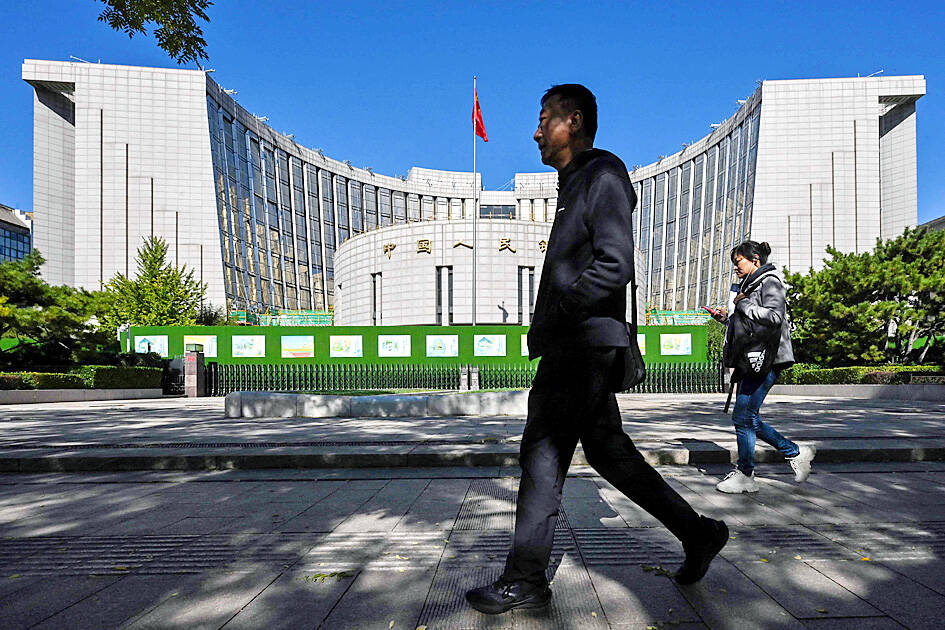China’s central bank yesterday said it had cut two key interest rates to historic lows, in the latest move by Beijing to boost sluggish spending and kickstart the world’s second-largest economy.
The cuts come just days after the country posted its slowest quarterly growth in a year and a half, underlining the deep economic woes the country faces.
Leaders are targeting annual growth of five percent this year, but that goal is being challenged by weak consumption and a prolonged and debilitating debt crisis in the colossal property sector.

Photo: AFP
The one-year loan prime rate (LPR), which constitutes the benchmark for the most advantageous rates lenders can offer to businesses and households, was cut from 3.35 percent to 3.1 percent.
The five-year LPR, the benchmark for mortgage loans, was cut from 3.85 percent to 3.6 percent.
Both rates were last reduced in July and are sitting at all-time lows.
The economy grew 4.6 percent year-on-year in the third quarter, its slowest rate in a year and a half, Chinese government data released on Friday showed.
Authorities acknowledged a “complicated and severe external environment... as well as new problems of domestic economic development.”
The data came after weeks of announcements and news conferences about a stimulus plan, although investors say they are still waiting to see more details.
The country’s top banks on Friday cut interest rates on yuan-denominated deposits for the second time this year in another potential boost to spending.
People’s Bank of China Governor Pan Gongsheng (潘功勝) said that authorities were considering a further cut to the amount commercial lenders must hold in reserve before the end of the year.
Months of sluggish spending have raised fears that China would dip back into deflation after it ended a months-long stretch of falling prices early this year.
Pinpoint Asset Management Ltd (保銀私募基金管理) president and chief economist Zhiwei Zhang (張智威) said yesterday’s rate cut was “an encouraging sign.”
“The monetary policy has clearly shifted to a more supportive stance since the press conference on September 24. The real interest rate in China is too high,” he said.
Meanwhile, the central bank yesterday also conducted its first operations under a swap facility designed to bolster the stock market, exchanging assets worth 50 billion yuan (US$7 billion) with brokerages, fund companies and insurers.
The authorities said 20 institutions participated in the swap operations with a fee rate of 20 basis points.
Under the swap scheme, initially worth 500 billion yuan, brokerages, asset managers and insurers can have easier access to funding by exchanging risk assets such as exchange-traded funds and blue-chip stocks for highly liquid assets such as treasury bonds and central bank bills.
The 20 participants include China International Capital Corp (中國國際金融), Citic Securities Co (中信證券), China Asset Management Co (華夏基金管理) and E Fund Management Co (易方達基金管理).
Additional reporting by Reuters

Vincent Wei led fellow Singaporean farmers around an empty Malaysian plot, laying out plans for a greenhouse and rows of leafy vegetables. What he pitched was not just space for crops, but a lifeline for growers struggling to make ends meet in a city-state with high prices and little vacant land. The future agriculture hub is part of a joint special economic zone launched last year by the two neighbors, expected to cost US$123 million and produce 10,000 tonnes of fresh produce annually. It is attracting Singaporean farmers with promises of cheaper land, labor and energy just over the border.

US actor Matthew McConaughey has filed recordings of his image and voice with US patent authorities to protect them from unauthorized usage by artificial intelligence (AI) platforms, a representative said earlier this week. Several video clips and audio recordings were registered by the commercial arm of the Just Keep Livin’ Foundation, a non-profit created by the Oscar-winning actor and his wife, Camila, according to the US Patent and Trademark Office database. Many artists are increasingly concerned about the uncontrolled use of their image via generative AI since the rollout of ChatGPT and other AI-powered tools. Several US states have adopted

A proposed billionaires’ tax in California has ignited a political uproar in Silicon Valley, with tech titans threatening to leave the state while California Governor Gavin Newsom of the Democratic Party maneuvers to defeat a levy that he fears would lead to an exodus of wealth. A technology mecca, California has more billionaires than any other US state — a few hundred, by some estimates. About half its personal income tax revenue, a financial backbone in the nearly US$350 billion budget, comes from the top 1 percent of earners. A large healthcare union is attempting to place a proposal before

KEEPING UP: The acquisition of a cleanroom in Taiwan would enable Micron to increase production in a market where demand continues to outpace supply, a Micron official said Micron Technology Inc has signed a letter of intent to buy a fabrication site in Taiwan from Powerchip Semiconductor Manufacturing Corp (力積電) for US$1.8 billion to expand its production of memory chips. Micron would take control of the P5 site in Miaoli County’s Tongluo Township (銅鑼) and plans to ramp up DRAM production in phases after the transaction closes in the second quarter, the company said in a statement on Saturday. The acquisition includes an existing 12 inch fab cleanroom of 27,871m2 and would further position Micron to address growing global demand for memory solutions, the company said. Micron expects the transaction to